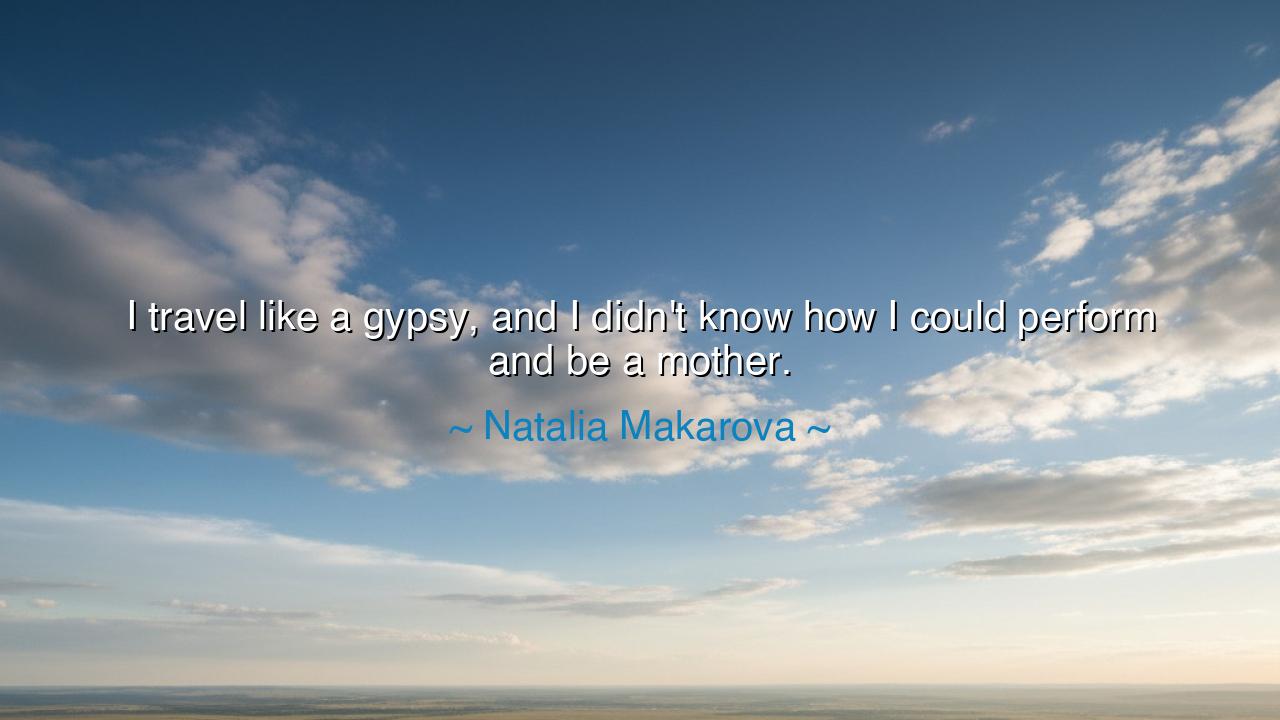
I travel like a gypsy, and I didn't know how I could perform and






“I travel like a gypsy, and I didn’t know how I could perform and be a mother.” Thus spoke Natalia Makarova, the great ballerina whose life was one of movement, performance, and sacrifice. In her words lies the eternal struggle between duty and desire, between the calling of one’s art and the calling of one’s blood. She evokes the restless figure of the gypsy, wandering from place to place, never bound to a single home, carried always by the demands of the road. Yet beneath this freedom lies a deeper tension: how to reconcile a life of constant flight with the rootedness required to nurture and raise a child.
When she compares her life to that of a gypsy, Makarova speaks of a life unmoored, carried by performance across borders and stages, always in motion. Such is the fate of the artist whose art demands presence in the far corners of the world. To live this way is to embrace both beauty and burden: the beauty of seeing many lands, hearing many tongues, encountering many souls; the burden of never resting, of never belonging fully to one place. In these words, Makarova reveals the price of greatness—mobility without stability, brilliance without the quiet peace of home.
Yet the heart of her reflection is not on travel alone, but on the difficulty of being a mother while answering the call of her art. For motherhood is the opposite of the road: it is rootedness, constancy, and sacrifice for the sake of another life. To raise a child is to build a sanctuary of steadiness, where love may take root and grow. But how can one build such a sanctuary while moving endlessly, carried like a leaf by the winds of performance? Makarova’s words are the confession of a soul torn between two sacred duties: the duty to her calling, and the duty to her child.
History echoes with such struggles. Consider Sophocles’ Antigone, torn between the law of the king and the law of the heart. Or remember the story of Medea, who could not reconcile her duties as wife and mother with the betrayal of her husband, and in tragedy chose destruction. Even beyond legend, in the lives of real women—leaders, warriors, and artists—we see this same tension. Cleopatra, bound to rule Egypt, yet also a mother; Marie Curie, bound to the pursuit of knowledge, yet also raising children. Each bore the weight of balancing the personal and the eternal, the home and the world. Makarova’s confession places her among this lineage of women who wrestled with destiny and love at once.
There is deep wisdom in her honesty. For she does not speak as one who found all answers, but as one who reveals the difficulty of the question. Her words remind us that greatness often demands cost, and that no life, however glittering, escapes the burden of sacrifice. To live fully is not to escape tension, but to bear it with dignity. The artist who travels and the mother who nurtures are not enemies but two halves of a soul, each demanding reverence, each requiring strength.
The lesson for us is clear: when life presents us with competing duties, we must not despair at the conflict but embrace it as the very substance of our humanity. Few paths are straight; most are winding. To love your work and to love your family are not contradictions, but callings that must be balanced with wisdom, humility, and courage. The one who tries to carry both, even imperfectly, is greater than the one who abandons either in despair.
Practical wisdom flows from this. If you are called to travel, carry with you the roots of home—your values, your love, your commitments—so that distance does not sever what is sacred. If you are called to nurture, know that your love need not bind you in chains but can also inspire your work. And if you face the burden of both, walk with patience, forgiving yourself when the balance tilts, and striving always to return to harmony.
Thus let Natalia Makarova’s words echo as a teaching: life on the road is freedom, but motherhood is anchor; to live both is struggle, yet in the struggle lies greatness. For the measure of a life is not in escaping these tensions, but in holding them with love, until they form the music of a destiny both broken and whole, both restless and rooted.






AAdministratorAdministrator
Welcome, honored guests. Please leave a comment, we will respond soon